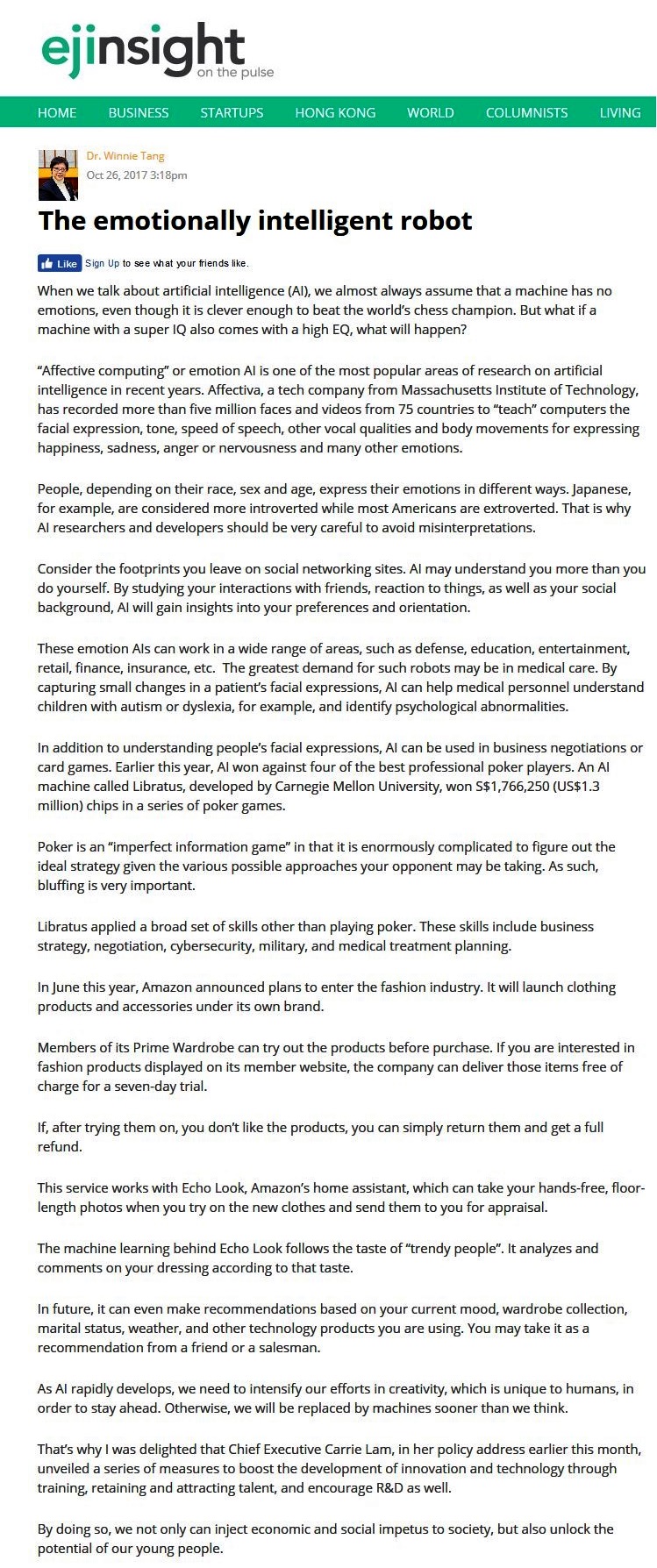網上版請按此

The emotionally intelligent robot
When we talk about artificial intelligence (AI), we almost always assume that a machine has no emotions, even though it is clever enough to beat the world's chess champion. But what if a machine with a super IQ also comes with a high EQ, what will happen?
"Affective computing" or emotion AI is one of the most popular areas of research on artificial intelligence in recent years. Affectiva, a tech company from Massachusetts Institute of Technology, has recorded more than five million faces and videos from 75 countries to "teach" computers the facial expression, tone, speed of speech, other vocal qualities and body movements for expressing happiness, sadness, anger or nervousness and many other emotions.
People, depending on their race, sex and age, express their emotions in different ways. Japanese, for example, are considered more introverted while most Americans are extroverted. That is why AI researchers and developers should be very careful to avoid misinterpretations.
Consider the footprints you leave on social networking sites. AI may understand you more than you do yourself. By studying your interactions with friends, reaction to things, as well as your social background, AI will gain insights into your preferences and orientation.
These emotion AIs can work in a wide range of areas, such as defense, education, entertainment, retail, finance, insurance, etc. The greatest demand for such robots may be in medical care. By capturing small changes in a patient's facial expressions, AI can help medical personnel understand children with autism or dyslexia, for example, and identify psychological abnormalities.
In addition to understanding people's facial expressions, AI can be used in business negotiations or card games. Earlier this year, AI won against four of the best professional poker players. An AI machine called Libratus, developed by Carnegie Mellon University, won S$1,766,250 (US$1.3 million) chips in a series of poker games.
Poker is an "imperfect information game" in that it is enormously complicated to figure out the ideal strategy given the various possible approaches your opponent may be taking. As such, bluffing is very important.
Libratus applied a broad set of skills other than playing poker. These skills include business strategy, negotiation, cybersecurity, military, and medical treatment planning.
In June this year, Amazon announced plans to enter the fashion industry. It will launch clothing products and accessories under its own brand.
Members of its Prime Wardrobe can try out the products before purchase. If you are interested in fashion products displayed on its member website, the company can deliver those items free of charge for a seven-day trial.
If, after trying them on, you don't like the products, you can simply return them and get a full refund.
This service works with Echo Look, Amazon's home assistant, which can take your hands-free, floor-length photos when you try on the new clothes and send them to you for appraisal.
The machine learning behind Echo Look follows the taste of "trendy people". It analyzes and comments on your dressing according to that taste.
In future, it can even make recommendations based on your current mood, wardrobe collection, marital status, weather, and other technology products you are using. You may take it as a recommendation from a friend or a salesman.
As AI rapidly develops, we need to intensify our efforts in creativity, which is unique to humans, in order to stay ahead. Otherwise, we will be replaced by machines sooner than we think.
That's why I was delighted that Chief Executive Carrie Lam, in her policy address earlier this month, unveiled a series of measures to boost the development of innovation and technology through training, retaining and attracting talent, and encourage R&D as well.
By doing so, we not only can inject economic and social impetus to society, but also unlock the potential of our young people.
Dr. Winnie Tang
Honorary Professor, Department of Computer Science, The University of Hong Kong